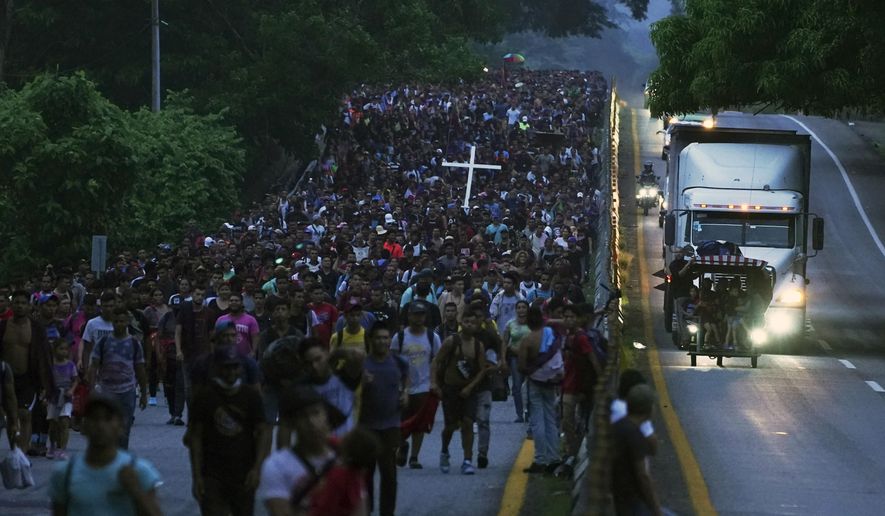The Homeland Security Department’s announcement that it will oust some Venezuelans caught jumping the border is turning out to be less than it seems, according to Border Patrol agents and analysts who say the policy is riddled with holes.
Mexico has slapped a limit on the number of Venezuelans it will take back, Border Patrol agents said. The exact number isn’t clear, but Border Patrol agents said it will put a significant dent in the U.S. effort.
Homeland Security hasn’t said whether families or children traveling alone will be subject to the policy. Carving them out would further reduce the universe of people blocked at the border.
Stephen Miller, an architect of President Trump’s immigration policies who is now president of America First Legal, said the Biden administration is fooling people into thinking it has taken a step toward border security. He predicted that many Venezuelans who try to jump the border will succeed.
“This is another pathetic misdirection from the open borders zealots running the Biden administration. Between backdoor parole, exempt demographics, arbitrary caps, asylum fraud, and the masses of gotaways (because they aren’t going back to Venezuela), it’s just a thin smokescreen for yet more open borders,” Mr. Miller told The Washington Times.
Facing border chaos, the Biden administration has announced an effort to stop at least some of the Venezuelans.
SEE ALSO: Border Patrol union chief says Mayorkas could be impeached over ‘whipping’ fiasco
Venezuela has become a leading source of illegal immigrants, who are swamping El Paso, Texas, and other U.S. cities.
Homeland Security Secretary Alejandro Mayorkas’ solution is to create an avenue for 24,000 Venezuelans to enter the U.S. legally, albeit on a short-term basis, while pushing other Venezuelans back to Mexico.
To gain Mexico’s cooperation, the administration announced it would double the number of seasonal non-farm work visas for foreigners in fiscal 2023.
Mr. Mayorkas didn’t say explicitly what authority he was using, but immigrant rights groups said it was Title 42 — a pandemic-era policy pioneered by Mr. Trump.
The activists were none too happy.
“We can’t celebrate the administration’s move to create a path to safety for some Venezuelans if the price to pay is cutting off access for many others and attempting to entrench an illegal policy,” said Lee Gelernt, an American Civil Liberties Union lawyer who is leading a legal challenge to Title 42.
Benjamin Johnson, executive director at the American Immigration Lawyers Association, said he was “deeply disturbed” by the return-to-Mexico policy.
He predicted that those pushed back across the boundary won’t return to Venezuela and instead will keep trying to jump the border until they succeed.
Homeland Security did not respond to inquiries for this report, leaving unanswered questions about its plans.
The administration has said it won’t subject unaccompanied children to Title 42.
The administration also has been lenient to parents showing up with children. It has applied Title 42 in about 1 in 5 family cases this year, so it’s not clear whether many families will be sent back to Mexico.
Then there’s Mexico’s limit on cooperation.
The National Border Patrol Council said agents are aware that Mexico has capped the number of Venezuelans it will take back. The actual cap is unknown, but the council said it is “a small percentage of what’s actually coming in.”
“Basically a PR stunt,” the council tweeted.
The Mexican Embassy didn’t respond to a request for comment.
The plan Mr. Mayorkas announced to allow 24,000 Venezuelans to enter the U.S. legally builds on programs he used to admit 77,000 Afghan evacuees last year and 100,000 Ukrainians this year.
The Afghans and Ukrainians entered the U.S. under Mr. Mayorkas’ “parole” authority, which grants a special national interest waiver to the law barring entry. Parole allows a two-year legal presence and application for a work permit, which means the ability to hold a job legally. The door also opens to certain taxpayer benefits.
It is not meant to be a pathway to permanent status or citizenship, though the Biden administration has asked Congress to create a pathway for the Afghans.
Each of the 24,000 Venezuelans must be sponsored by an American citizen or current lawful resident, who must promise to provide financial support and guidance to the arrivals. That was also a condition for the 100,000 Ukrainians, though not for the Afghans.
“These actions make clear that there is a lawful and orderly way for Venezuelans to enter the United States, and lawful entry is the only way,” Mr. Mayorkas said in announcing the program.
He added: “Those who attempt to cross the southern border of the United States illegally will be returned to Mexico and will be ineligible for this process in the future.”
Immigrant rights activists said the sponsorship requirement would block out some of the neediest Venezuelan refugees because they are unlikely to have ties to the U.S.
The 24,000 allowance is a fraction of the total flow. Border Patrol agents nabbed more than 150,000 Venezuelans who were in the U.S. illegally from Oct. 1, 2021, through Aug. 31, 2022.
Embracing expulsions marks a significant symbolic reversal for the Biden administration, which is still fighting in the courts to end the Title 42 tool it is now harnessing.
A court has issued an injunction blocking the administration from ending Title 42.
Homeland Security said the Venezuelan program will help tamp down illegal crossings, and the department will look to expand it to people of other nationalities.
• Stephen Dinan can be reached at sdinan@washingtontimes.com.




Please read our comment policy before commenting.